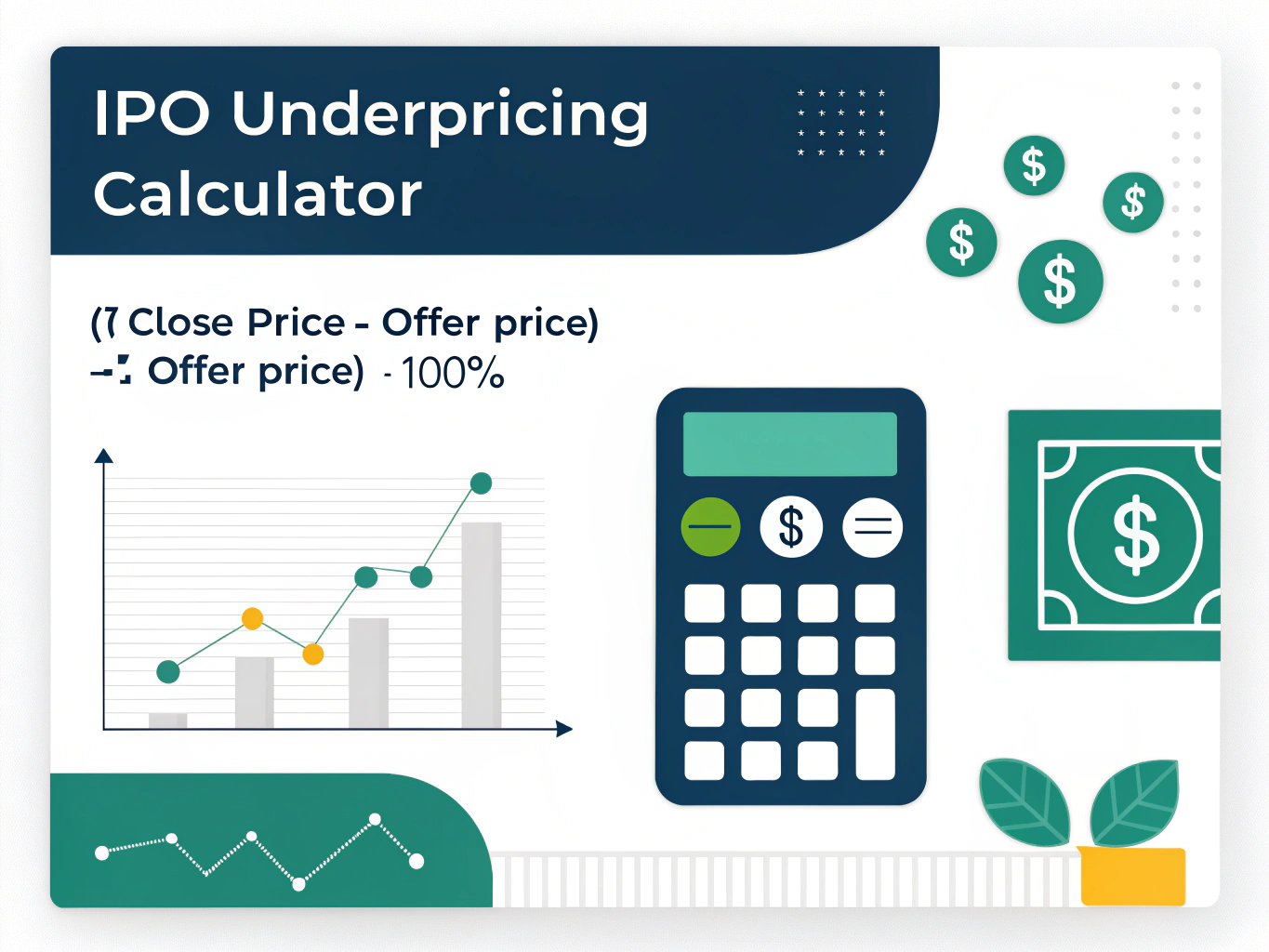IPO Underpricing Analyzer
Is this tool helpful?
How to Use the IPO Underpricing Analyzer Effectively
To analyze IPO underpricing using this calculator, follow these simple steps:
- Enter the IPO Offer Price: Input the initial offering price set by the company. For example, if a company sets its IPO price at $35.50 per share, enter this value in the first field.
- Input the First-Day Close Price: Enter the stock’s closing price at the end of its first trading day. For instance, if the stock closed at $45.75, enter this amount in the second field.
- Click “Calculate Underpricing” to view your results.
Understanding IPO Underpricing
IPO underpricing refers to the phenomenon where a company’s shares trade significantly higher than their initial offering price on the first day of trading. The mathematical formula for calculating underpricing is:
$$ \text{Underpricing} = \frac{\text{Close Price} – \text{Offer Price}}{\text{Offer Price}} \times 100\% $$Significance in Financial Markets
Understanding IPO underpricing is crucial for:
- Investors seeking potential first-day trading opportunities
- Companies planning to go public and determining optimal pricing strategies
- Investment bankers and underwriters establishing offering prices
- Market analysts evaluating IPO performance and market sentiment
Benefits of Using the IPO Underpricing Analyzer
This tool offers several advantages for market participants:
- Instant calculation of first-day returns
- Automatic comparison with industry benchmarks
- Quick assessment of IPO pricing efficiency
- Data-driven decision-making support
- Real-time evaluation of investment opportunities
Practical Applications
The analyzer serves multiple stakeholders in the IPO process:
- Individual investors evaluating potential IPO investments
- Portfolio managers assessing IPO allocation strategies
- Investment bankers reviewing pricing effectiveness
- Academic researchers studying market efficiency
Real-World Examples and Case Studies
Technology Sector IPO Example
Consider a technology company with:
- IPO Offer Price: $28.00
- First-Day Close: $42.50
Using the calculator:
Underpricing = ($42.50 – $28.00) / $28.00 × 100% = 51.79%
This significant underpricing indicates strong market demand and potential money left on the table.
Healthcare Sector Example
For a healthcare company:
- IPO Offer Price: $16.50
- First-Day Close: $18.25
Calculation shows:
Underpricing = ($18.25 – $16.50) / $16.50 × 100% = 10.61%
This moderate underpricing aligns closer to typical market expectations.
Strategic Implications of IPO Underpricing
For Companies Going Public
Understanding underpricing helps companies:
- Optimize pricing strategies
- Maximize capital raised
- Balance investor demand with fundraising goals
- Evaluate underwriter performance
For Investors
The analyzer assists investors in:
- Identifying potential first-day trading opportunities
- Comparing IPO performance across sectors
- Developing IPO investment strategies
- Understanding market sentiment
Industry Benchmarking
The tool includes industry average benchmarking of 14.0%, allowing users to:
- Compare specific IPO performance against market norms
- Identify unusual pricing patterns
- Assess market conditions
- Evaluate pricing efficiency
Best Practices for Analysis
To maximize the tool’s effectiveness:
- Compare results across similar sector IPOs
- Consider market conditions and timing
- Analyze trends over multiple IPOs
- Include broader market context in analysis
Frequently Asked Questions
What is a typical range for IPO underpricing?
While underpricing varies significantly, historical averages typically range from 10% to 20% across different markets and sectors.
How does underpricing benefit different stakeholders?
Underpricing can benefit institutional investors through initial returns, while companies might use it to ensure successful offerings and generate market interest.
When should I use this calculator?
Use the calculator when evaluating IPO performance, planning IPO investments, or analyzing historical IPO data for market research.
Can underpricing vary by industry?
Yes, different sectors often show varying levels of underpricing, with technology and biotech sectors historically showing higher average underpricing.
How does market condition affect underpricing?
Market conditions significantly influence underpricing levels, with bull markets typically showing higher underpricing than bear markets.
What role do underwriters play in IPO pricing?
Underwriters help determine the initial offering price based on market conditions, company fundamentals, and investor demand during the book-building process.
Advanced Analysis Considerations
When using the calculator, consider these additional factors:
- Market volatility and timing
- Sector-specific trends
- Company size and age
- Overall market sentiment
- Comparable company performances
Supporting Decision Making
The analyzer supports various decisions:
- IPO participation strategies
- Portfolio allocation decisions
- Market timing considerations
- Risk assessment evaluations
Important Disclaimer
The calculations, results, and content provided by our tools are not guaranteed to be accurate, complete, or reliable. Users are responsible for verifying and interpreting the results. Our content and tools may contain errors, biases, or inconsistencies. We reserve the right to save inputs and outputs from our tools for the purposes of error debugging, bias identification, and performance improvement. External companies providing AI models used in our tools may also save and process data in accordance with their own policies. By using our tools, you consent to this data collection and processing. We reserve the right to limit the usage of our tools based on current usability factors. By using our tools, you acknowledge that you have read, understood, and agreed to this disclaimer. You accept the inherent risks and limitations associated with the use of our tools and services.







